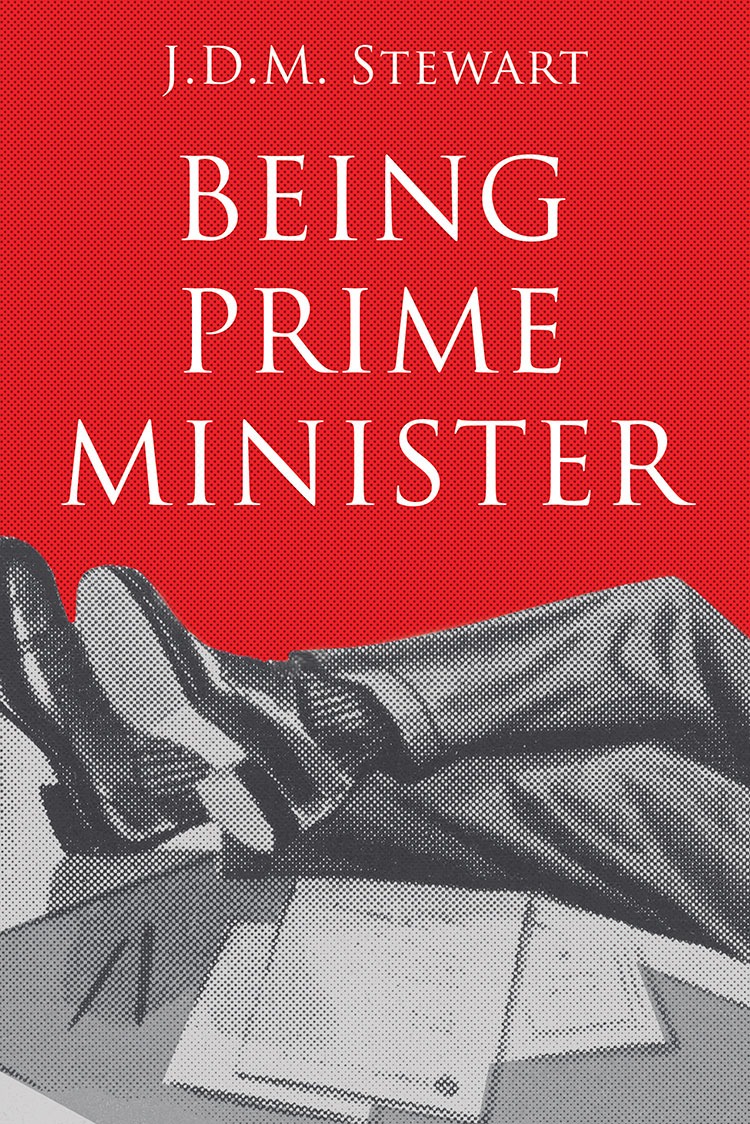Capturing What Makes PMs Tick
Book Review
J.D.M. Stewart
Being Prime Minister. Toronto, Dundurn Press, 2018.
Review by Anthony Wilson-Smith
 The job of being prime minister, Jean Chrétien once observed, is “never easy.” Some frustrations include the need to “hurt the feelings of a lot of people on a regular basis” and to “operate in the public eye with MPs who fret and bureaucrats who gossip and colleagues who disagree.” Not to mention, of course, making decisions that affect millions of lives—and sometimes sending soldiers off to wars from which some do not return.
The job of being prime minister, Jean Chrétien once observed, is “never easy.” Some frustrations include the need to “hurt the feelings of a lot of people on a regular basis” and to “operate in the public eye with MPs who fret and bureaucrats who gossip and colleagues who disagree.” Not to mention, of course, making decisions that affect millions of lives—and sometimes sending soldiers off to wars from which some do not return.
In those ways, the tribulations of being a Canadian prime minister have not changed greatly in the 151 years since Confederation. In that time, only 23 people have held the job; seven are alive. All have shared the relentless workload while, at the same time, approaching the position’s evolving, ever-growing pressures in sometimes unique ways. Those challenges, and the ways in which respective prime ministers greeted them, are the subject of Being Prime Minister, the breezily-written, impeccably-researched book by Toronto history teacher extraordinaire and writer J.D.M (James) Stewart.
Stewart’s first book stands out for several reasons. One is its rigour; he interviewed six of the seven living prime Ministers (only Stephen Harper refused) along with dozens of other sources, and spent countless hours poking through old books, correspondence and files dating back to Confederation. (Disclosure: I read the early manuscript of this book and made suggestions on anecdotes and potential interviewees. I did so very happily—and for no money.)
Being Prime Minister is apolitical in approach. Stewart is interested in what makes the occupants of 24 Sussex tick rather than their policy initiatives. He is also an anomaly in a cynical time; he approached this project with a favourable prejudice toward all his subjects. To that end, there are chapters on everything from family pets to favourite sports to travel habits and the wish for privacy in a very public position. He is clear-eyed about the flaws of some subjects. He notes, for example, John Diefenbaker’s disorganization in approaching key files and his willingness to absorb opinions from the people physically closest to him over those of acknowledged experts.
Some of the most compelling anecdotes are small ones. Lester Pearson, Stewart writes, often told a story about “a phone call he took from his wife, Maryon after he became Liberal party leader. She congratulated him and told him not to forget to pick up a pound of hamburger on the way home.” (Maryon Pearson, renowned for her sharp humour, was also the creator of the famous line that “behind every successful man is a surprised woman.”) Chrétien, who cultivated his “little guy” populist persona, was a sophisticated art lover who liked to watch football on Sunday afternoons—with the sound off and classical music in the background. “One third of the players are named Smith, anyway, so I could still follow it,” he joked to Stewart.
One of the most important personal challenges for many recent prime ministers has been finding a balance between their workload and family: Pierre Trudeau, Brian Mulroney, Stephen Harper and now Justin Trudeau have all had young families while in office. All have noted that the time spent with family gave them, alongside joy, perspective and motivation in their jobs. For related reasons, as Stewart observes, the greatest perquisite is the official prime ministerial summer residence at Harrington Lake (Lac Mousseau in French) where they and their families can unwind. (Even that is not trouble-free: Mulroney recalls how, on the family’s first weekend there, their standard poodle, Oscar, lost a fight with a porcupine, so the family spent the evening removing quills from the startled dog.)
With books, as with all else, one of the keys to success is making hard things seem easy. Stewart’s seemingly effortless recitation of coordinated, well-told anecdotes is the result of his formidable research. The stories flesh out our understanding of the ways that personality shapes destiny. Stewart’s micro approach to his subjects reflects what the historian Barbara Tuchman once described as “history by the ounce”; through learning about small details and human interactions, we gain a more complete image of how larger events come to pass. Through understanding the people who served as prime minister, we also better understand the position. As Pierre Trudeau once said in his trademark flip manner, “It’s not a perfect job, but it sure beats working.” Only 22 other Canadians have known how true that is firsthand. But thanks to Stewart, the rest of us now have a far better understanding of what it takes to be PM—and how to survive the job.
Anthony Wilson-Smith, President and CEO of Historica Canada, is a former Editor-in-Chief of Maclean’s.
